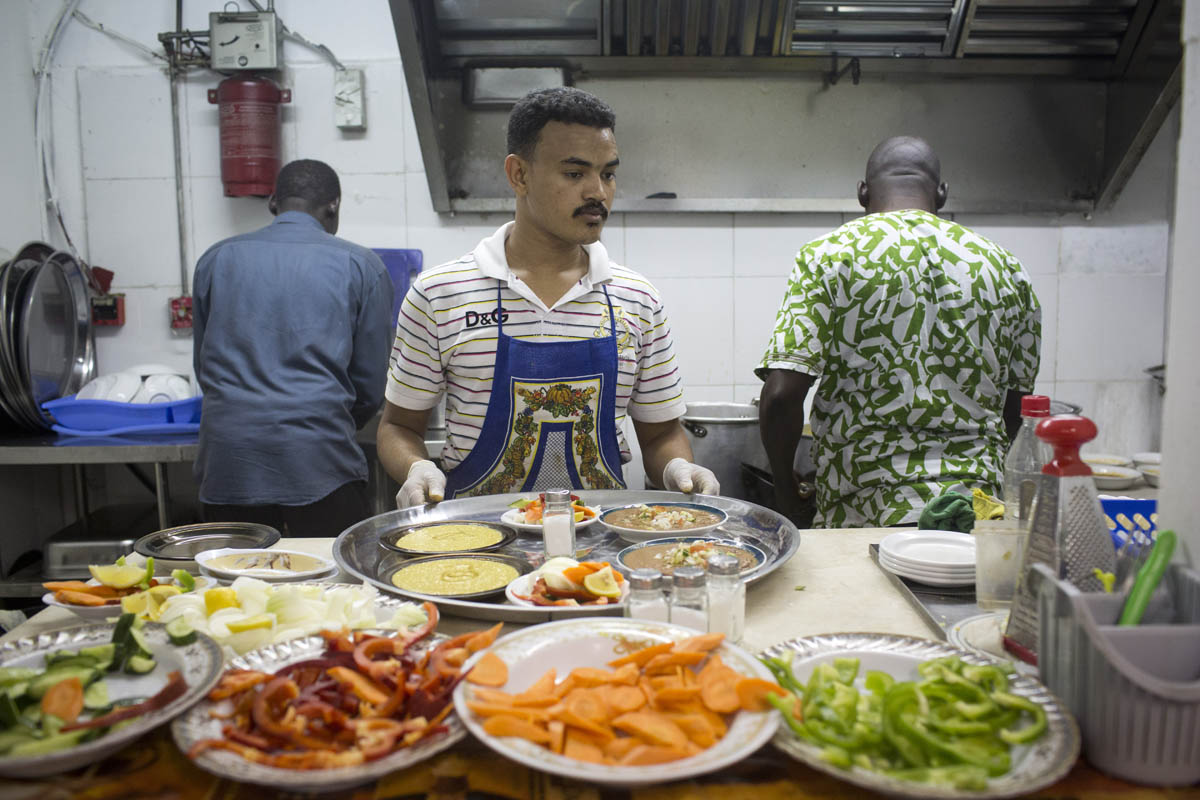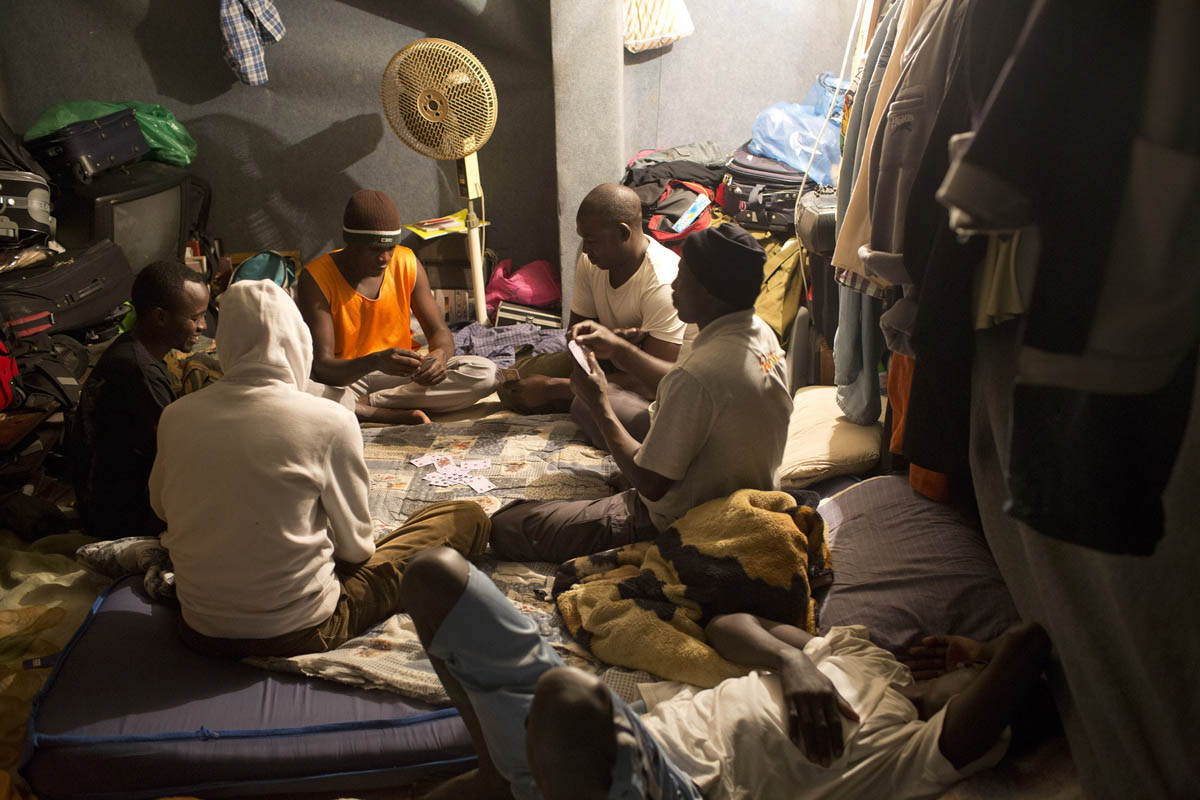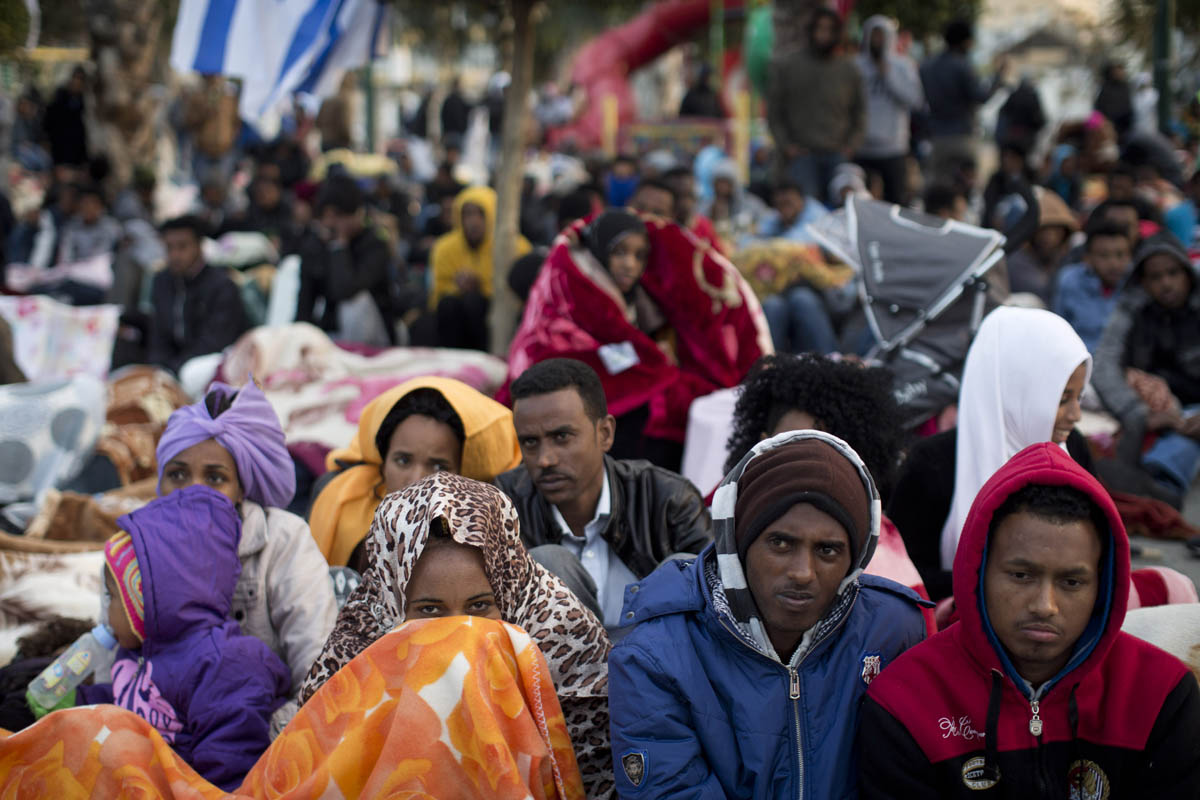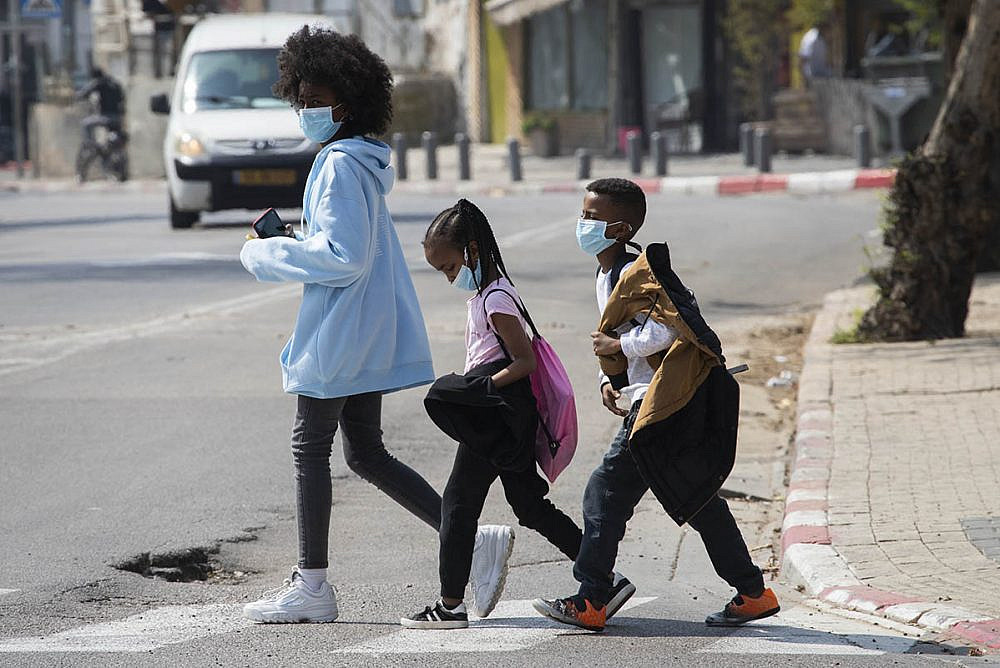Asylum seekers in Israel are “on the brink of catastrophe” according to community members and activists, as the number of infections from the novel coronavirus in the country continues to climb.
Asylum seekers are facing difficult conditions, including furloughs, inability to receive assistance from the state, a lack of information, and poor housing in extraordinary circumstances. The closure of businesses and institutions that regularly employ asylum seekers is leaving many families worried they will soon be thrown into the street with nothing to eat.
Approximately 35,000 asylum seekers live in Israel today, most of whom are from Eritrea, as well as a small Sudanese community. For years, Israel has refused to check their asylum requests, leaving them in legal limbo. Over the past decade, only 13 Eritreans and one Sudanese citizen have been recognized by the Israeli government as refugees.
Their precarious legal situation has serious implications for asylum seekers’ ability to cope with the outbreak. While Israelis who have been laid off or forced to take furlough experience financial difficulties, they can receive unemployment benefits; asylum seekers are not eligible for these protections. Without the assistance offered by the state and without a community, family, or savings, they will be the first to face the deadly repercussions of the virus.
“The government doesn’t care about us, they have not spoken to us,” says Cabrom Tuwalda, an asylum seeker from Eritrea. “Bibi [Netanyahu] said we were ahead of the world in dealing with the pandemic, but there are 40,000 people here and no one is speaking to them.”

“The harm to asylum seekers is the most fatal and could lead to humanitarian disaster if the state does not get its act together,” says Tali Ehrenthal, the executive director of ASSAF, an NGO that provides aid to refugees and asylum seekers in Israel. “We are witnessing a wave of layoffs, people have no social rights nor are they entitled to unemployment. They have no way to pay rent and may be thrown into the street.”
No safety net
The restrictions imposed by the Israeli government have led to layoffs in sectors that often employ asylum seekers, including cleaning, restaurants, and cafes. It is difficult to know how many asylum seekers have lost their jobs, at least temporarily, but the most cautious estimates put the number at around 50 percent of adults. The “safety net” promised to Israeli workers by Finance Minister Moshe Kahlon on Sunday is a pipe dream for asylum seekers.
“If they do not find a solution for people within a week, we won’t have anything to eat,” says Dejan Mangesha, a 25-year-old asylum seeker from Eritrea who works in translation and education. Mangesha says that in addition to layoffs, many do not leave their homes looking for work because there is no one to look after their children now that schools and daycare centers have shut down. “People in the community are under intense pressure,” he says. “Most of them work in restaurants, hotels, and cleaning. It’s all closed. People just don’t work, except those who work in the restaurant kitchens that deliver. People are put on furlough without pay and it is unclear when they will return to work.”

While many Israelis can apply for a loan from the bank or lean on their families for assistance, asylum seekers do not have such an option. “We don’t have an extended family here to help us,” Mangesha says. “People live off their daily work and have no savings.” Mangesha himself lost one of his jobs, as an after-school tutor. “The truth is I’m under pressure,” he admits. “I lost some of my livelihood and it is unclear what another month or two will bring, or how I will be able to pay rent.”
“The coronavirus does not differentiate between Israelis and refugees,” says Tuwalda. “While Israelis are busy buying food, asylum seekers are losing their jobs and worrying that they will have no way to pay rent. People with children are barely living month-to-month. I prefer not to imagine what will happen after a month or two without work.”
Tuwalda, who works in a restaurant in Tel Aviv, has been home for five days. “I understand the distress facing my employer, he has not had any customers for two weeks and has begun to get rid of the workers even before the prime minister’s decision [to bring life in Israel to a halt]. Most asylum seekers work as dishwashers, cooks, or as janitors at malls and schools. These are places that have been shut down.”
‘It’s like being in a small jail’
Fischla is a 43-year-old asylum seeker from Eritrea who was also recently let go from his job at an event hall in Tel Aviv. “We were told there was no work until the government decides otherwise,” he says. “Even during a normal month it is difficult for us, getting paid and immediately paying for food, electricity, rent, and property taxes. Now we have the expenses but no income.”
Fischla’s wife, a kindergarten teacher, hasn’t worked since the government closed educational institutions. She is concerned she won’t be able to pay rent next month. “I can hang on for another week or two, but the situation is really tough,” she says. “What will we do after that?” Fischla says he and his family are self-isolating in their home, and phoning friends to get updates. “We’re all in the same situation, it’s like being in a small jail.”

Kav LaOved, a workers’ rights non-profit that assists asylum seekers, is reporting an increase in calls. “We’ve received requests for help from workers in the hotel industry, restaurants, construction and cleaning companies, most of whom have been put on unpaid holiday, and some of whom have been fired effective immediately,” says Noa Kaufman, Kav LaOved’s refugee coordinator. “Some employers, with good intentions, pointed their workers toward employment services or explained how they could get unemployment allowance, but we’ve had to tell [asylum seekers] that they’re not eligible for all these benefits.”
Eden Tesfamariam, an asylum seeker who works as a community mediator for ASSAF, says that single mothers in particular cannot now go out to find work. “There is no one to help with their children, and the government is not going to help,” she says. She fears most being unable to pay rent, and ending up homeless.
Confiscated wages
Israel’s so-called “deposit law,” which was passed in 2017, mandates employers to put 20 percent of any asylum seeker employees’ wages into an escrow account to be released in the event that the individual leaves the country. Kav LaOved and other organizations on Sunday sent an urgent request to several government ministers that these funds be released and returned to the asylum seekers whose wages they were deducted from.
“People have been depositing a fifth of their monthly paycheck for the past three years, so they have no reserves if there’s an emergency,” Kaufman says. “We want them to be able to withdraw this money.” Kav LaOved also sent a request to Finance Minister Moshe Kahlon that he expand the “safety net” he promised for workers to include asylum seekers.
The High Court is still considering a 2017 petition submitted by a coalition of refugee and immigrants’ rights organizations against the deposit law itself. The petition cited a fear that the law would worsen asylum seekers’ economic situation, given that they already had no social welfare benefits to draw on.
“They have to give us our money from our paychecks,” says Tesfamariam.
The impact of the coronavirus crisis goes beyond the economic sphere. Asylum seekers are not covered by state insurance laws, although some are covered by their workplace through private insurers, and employers are officially required to continue paying the insurance of anyone who has been put on unpaid leave.
“The fear is that the layoffs will lead to a halt in private medical insurance paid by employers,” says Zoe Gutzeit, manager of an open clinic run by Physicians for Human Rights — Israel in Jaffa. “This means removing access to medical services.” Moreover, she says, the rights that they accrued during their former employment won’t carry over if they find work again once the crisis is over. As such, Gutzeit stresses, they may not be covered for certain chronic illnesses or serious health issues until they’ve been working again for some time.
“Asylum seekers are frightened of contracting the illness, and the knowledge that they have no medical coverage puts them under even greater pressure,” says Sigal Rozen of the Hotline for Refugees and Migrants.

Beyond medical insurance, asylum seekers say that self-isolation is almost impossible for them. Most do not have rooms of their own, and many families live together in cramped one- or two-room apartments.
“Isolation doesn’t help when there are three people in an illegally-divided three-room apartment,” Mangesha says. “They say not to leave the house, but there aren’t normal conditions under which people can stay in.”
‘There’s going to be a catastrophe here’
A further problem is the lack of information. Until Sunday, the Health Ministry had not published guidance in Tigrinya, spoken by Eritrean asylum seekers. That day, they published a single voice message online. Asylum seeker activists and organizations have translated and distributed information themselves in an effort to fight back against rumors and fake news.
“We’ve tried to manage by ourselves, opening Facebook groups in order to try and reach those having suicidal thoughts,” says Tuwalda. “There hasn’t been an official announcement about the coronavirus. I understand that [the government] is also in a difficult position, but there’s going to be a catastrophe here. The flow of information is being heavily disrupted.”
Mangesha cites a message he received via WhatsApp about the military being deployed to Israel’s streets, the country shutting down, and people being barred from leaving their homes. “People were hysterical,” he says.
While many Israelis went out to stockpile food at the end of last week, asylum seekers have no such luxury, Tesfamariam says. “People have no more than a few hundred shekels to spend on food, and for a family that’s barely enough for a week,” she notes.

Many asylum seekers also stress that the contact tracing of those with COVID-19, and which is published in Hebrew-language media, is not translated into Tigrinya. “People don’t know how to protect themselves and the state doesn’t care to notify them,” says Ehrenthal. “No one is translating, and people don’t know if they’re endangering themselves and those around them.”
ASSAF, which during normal times assists the most vulnerable among the asylum seeker population — survivors of torture, trafficking victims, single mothers, etc — is continuing to provide assistance in keeping with Health Ministry instructions. Despite mobilizing funds of millions of shekels, the Welfare Ministry is not assisting at-risk asylum seekers. “They need to provide welfare services and psychosocial support to the community,” says Ehrenthal.
Everyone I spoke to emphasizes that the coronavirus presents the gravest threat the asylum seeker community has faced yet, and that it will continue to deteriorate in the coming days and weeks as a result of Israel’s policy of not recognizing them as refugees — a status that would give them access to secure housing, stable income, education and medical services.
Many say that life after the coronavirus will not be the same. Asylum seekers say they hope Israel will understand it has to recognize their rights. “The community will go into the streets if they have nothing to eat, and that will have an effect on the Israeli public,” says Tuwalda.
A version of this article was originally published in Hebrew on Local Call. Read it here.


